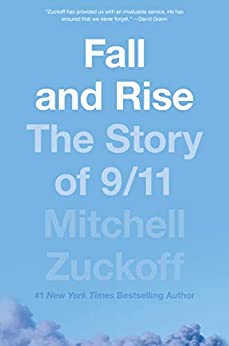More on this book
Community
Kindle Notes & Highlights
“The passage of time strips away the searing immediacy of the surprise attack and envelops it in layers of exposition and retrospective judgment,” Toll wrote. “Hindsight furnishes us with perspective on the crisis, but it also undercuts our ability to empathize with the immediate concerns of those who suffered through it.”7 He quoted John H. McGoran, a sailor on the doomed battleship USS California: “If you didn’t go through it, there are no words that can adequately describe it; if you were there, then no words are necessary.”
This book could begin nearly four decades before 9/11, in 1966, with Egypt’s execution of a fanatically anti-Western author named Sayyid Qutb, whose writings inspired two generations of Islamist terror groups. Or further back in time, to 1918, with the defeat of the last great Muslim empire,1 the Ottoman sultanate. Or even further, to 1798, the year Napoleon Bonaparte occupied Egypt. Or seven hundred years before that, with the start of the Crusades. Or five hundred years before that, when Muslims believe the first verses of the Quran were revealed to the Prophet Muhammad. Or more than two
...more
FAA controllers were taught to anticipate a specific sign or communication from a plane before declaring a hijacking76 in progress. A pilot might surreptitiously key in the transponder code “7500,” a universal distress signal, which would automatically flash the word hijack on the flight controller’s green-tinted radar screen. If the problem was mechanical, a pilot could key in “7600” for a malfunctioning transponder, or “7700” for an emergency. Otherwise, a pilot under duress could speak the seemingly innocuous word “trip” during a radio call when describing a flight’s course. An air traffic
...more
Strangers on a plane minutes earlier, the men and women aboard United Flight 93 called upon their survival instincts and discovered a warrior spirit that some might not have known they possessed. They boarded the flight as airline employees and everyday travelers, bound for home or business meetings or vacations or memorial services, but they emerged from a chrysalis of terror as a fighting band of brothers and sisters.
The forty heroes of Flight 93 couldn’t save themselves. They couldn’t return home to their loved ones. But they were all that stood between the hijackers and the destruction of the U.S. Capitol or the White House. All deserved to be honored and remembered as civilians turned combatants, the saviors of countless lives during the first battle of a new war. If there is a heaven, Lizz Wainio’s grandmothers were waiting there to greet every last one.
Brian and Ron found themselves amid a quarry of broken office furnishings. Chalky clouds of demolition dust obscured the daylight from blown-out windows. Brian waved his flashlight, calling “Who’s there? Where are you?” Before they heard a reply, Ron DiFrancesco felt overwhelmed by smoke. He pressed the fabric of a gym bag to his mouth as a filter, but it didn’t help. Fearing he’d pass out, Ron scrambled back to the stairwell. Knowing that the others in their group had acquiesced to the woman’s pleas and gone upstairs, Ron climbed24 after them.
Brian remained on the 81st floor, yelling and waving the flashlight. With his hearing affected by the crash, Stan Praimnath could barely hear the calls of his would-be rescuer. Fortunately, above his head he saw a small ray of light behaving like a lighthouse beam, sweeping back and forth. “I can see your light!” Stan yelled, and started to call out “left” and “right” to help his rescuer line up the beam with his location, moving toward it until only a nine-foot wall separated the two men. The office’s false ceiling had fallen, so above the wall a gap revealed the steel bones of the South
...more
This highlight has been truncated due to consecutive passage length restrictions.
Office labels followed a simple alphanumeric code that made them easy to locate: floor, ring, corridor, then room. So, 2D491 was an office on the second floor of the D Ring, near corridor Four, room 91.
Wally understood that these tasks would test his core belief—“Everybody that dies, that’s somebody’s favorite guy, whether it’s a prisoner or the richest guy in town or somebody else”—on a massive scale.
They didn’t know that Mayor Giuliani had ordered an evacuation of Lower Manhattan20 below Canal Street, an evacuation that sent hundreds of thousands of people through dust-covered streets uptown, across bridges, or onto tugs, ferries, fire boats, Coast Guard vessels, and pleasure craft that sailed from the smoldering island like a modern-day Dunkirk.
As he entered Chinatown, Jay strode down the center of Canal Street, on any other day a pedestrian death wish. He felt like the cartoon character Pigpen, filth clinging to his skin, trailing a cloud of dust. Jay sensed eyes upon him, so he turned around to see about twenty Chinese men following him at a respectful distance. One fell in step alongside Jay. “You okay?” the man asked. “Yeah,” Jay said, “I’m okay as long as I keep going. If I stop, I’m not going to want to start again.” “Where you going?” “The firehouse on Canal and Allen.” “Okay,” the man said, “we’ll make sure you get there.”
Amid the grief, word spread about what became known as the Miracle of Stairwell B. Producers for NBC reconnected the men of Ladder 6 with Josephine Harris on the show Dateline. With the camera rolling, they credited her with their survival and she lavished them with praise. “They are [the most] strong, brave, caring, kind people48 I have ever met,” Josephine said. “When I was scared, they held my hand. They took off their jackets and gave them to me when I was cold. They told me not to be afraid, they would get me out. And they did. They are magnificent.”


